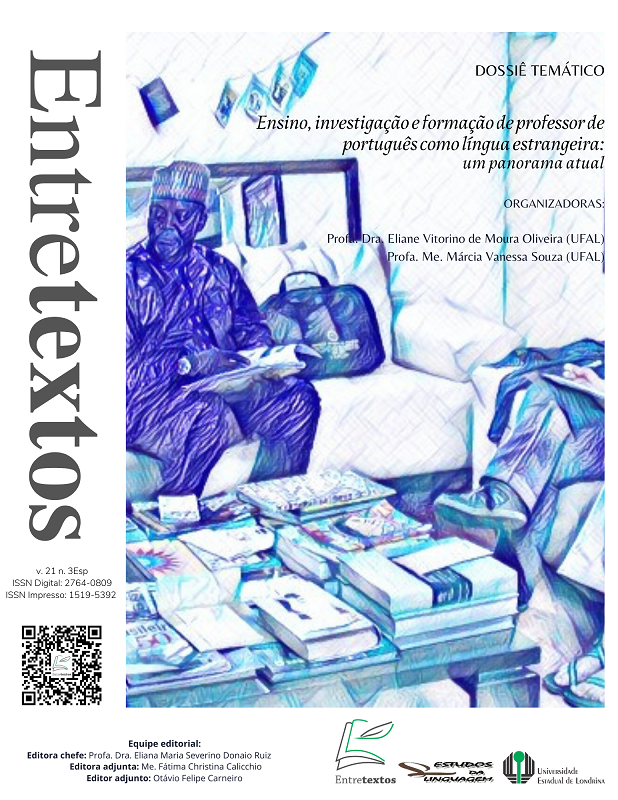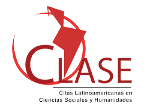PFL Teacher education at the Federal University of Espirito Santo:letter considerations and proposals
DOI:
https://doi.org/10.5433/1519-5392.2021v21n3Esp.p111Keywords:
Portuguese as a Foreign Language, Language Policies, Teacher EducationAbstract
The aim of this paper was to analyze the development of some teacher education processes focused on Portuguese as a Foreign Language (PFL) at the Federal University of Espírito Santo (Ufes), from 2014 to 2019. Therefore, studies on language policies (RAJAGOPALAN, 2013a, 2013b, 2018), teacher education (SILVA; LIMA, 2019) and curriculum (VEIGA-NETO, 2021) were discussed in order to present our considerations and analysis. Data was collected through semi-structured interviews with individuals who participated in actions related to PFL teaching and teacher education at Ufes. In addition, we analyzed the documents that were essential to understand this context within the time frame. Results show there are initiatives related to PFL teacher education from the Languages Department and the Language Center. However, those initiatives were considered as reactive and fragmented, which indicates the lack of institutionalization of PFL at this university. We expect that by discussing the experiences with teacher education focused on PFL in a specific context, this paper present contributions to the field of PFL, highlighting the need of institutional language policies that address the demands of PFL and valuing studies about teacher education.
Downloads
References
CASTRO, Francisco Tomé de. História do futuro: diagnóstico e perspectivas de políticas públicas para o ensino/aprendizagem de PLE-PL2 no Brasil do século XXI. 2013. Dissertação (Mestrado em Linguística Aplicada) - Instituto de Letras, Universidade de Brasília, Brasília, 2013.
CELANI, Maria Antonieta Alba. Ensino de línguas estrangeiras: ocupação ou profissão. In: LEFFA, Vilson J. (org.). O professor de línguas estrangeiras: construindo a profissão. 2. ed. Pelotas: EDUCAT, 2008. p. 23-43.
DUTRA, Anelise Fonseca. A formação inicial do professor de português língua estrangeira: aprendendo a ser um profissional colaborativo. Revista Signótica, Goiânia, v. 26, p. 579-602, 2014. Disponível em: http://revistas.ufg.br/index.php/sig/article/view/29709/17672. Acesso em: 7 fev. 2020.
FREIRE, Paulo. Pedagogia do oprimido. 17. ed. Rio de Janeiro: Paz e Terra, 1987. Disponível em: https://cpers.com.br/wp-content/uploads/2019/10/Pedagogia-do-Oprimido-Paulo-Freire.pdf. Acesso em: 10 maio 2020.
GUIMARÃES, Felipe Furtado; FINARDI, Kyria Rebeca; CASOTTI, Janayna Bertollo Cozer. Internationalization and language policies in Brazil: what is the relationship?. Revista Brasileira de Linguística Aplicada, Belo Horizonte, v. 19, n. 2, p. 295-327, abr./jun. 2019. Disponível em: https://www.scielo.br/scielo.php?script=sci_arttext&pid=S1984-63982019000200295&tlng=en. Acesso em: 04 set. 2020.
KUMARAVADIVELU, B. Toward a postmethod pedagogy. TESOL Quartely, Washington, v. 35, n. 4, p. 537-60, 2001.
LEFFA, Vilson J. Aprendizagem de línguas mediada por computador. In: LEFFA, Vilson L. (org.). Pesquisa em lingüística aplicada: temas e métodos. Pelotas: Educat, 2006. p. 5-30.
LEFFA, Vilson J. Aspectos políticos da formação do professor de línguas estrangeiras. In: LEFFA, Vilson J. (Org.). O professor de línguas estrangeiras: construindo a profissão. Pelotas, 2001, v. 1, p. 333-355.
LEFFA, Vilson J. Ensino de línguas: passado, presente e futuro. Revista de Estudos da Linguagem, Belo Horizonte, v. 20, n. 2, p. 389-411, jul./dez. 2012. Disponível em: http://periodicos.letras.ufmg.br/index.php/relin/article/view/2755. Acesso em: 20 maio 2019.
MELLO, Renata Rocha Vieira de. A formação de professores de português língua estrangeira/segunda língua na Universidade Federal do Espírito Santo. 2021. Dissertação (Mestrado em Linguística) - Universidade Federal do Espírito Santo, Vitória, 2021.
MILLER, Inés Kayon de. Formação de professores de línguas: da eficiência à reflexão crítica e ética. In: LOPES, Luiz Paulo da Moita (org.). Linguística aplicada na modernidade recente festchrift para Antonieta Celani. São Paulo: Parábola Editorial, 2013. p. 99-121.
MOREIRA, Antonio Flávio; SILVA, Tomaz Tadeu da (org.). Sociologia e teoria crítica do currículo: uma introdução. In: MOREIRA, Antonio Flávio; SILVA, Tomaz Tadeu da (org.). Currículo, cultura e sociedade. São Paulo: Cortez, 1994. p. 7-37.
PRABHU, N. S. There is no best method—why?.TESOL Quarterly, Washinton, v. 24, n. 2, p. 161-176, 1990.
RAJAGOPALAN, Kanavillil. Política de ensino de línguas no Brasil: história e reflexões prospectivas. In.: LOPES, Luiz Paulo da Moita (org.). Linguística aplicada na modernidade recente festschrift para antonieta celani. são Paulo: Parábola editorial, 2013a. p. 143-161.
RAJAGOPALAN, Kanavillil. Política linguística: do que é que se trata, afinal? In: NICOLAIDES, Christine et al. (org.). Política e políticas linguísticas. Campinas: Pontes Editores, 2013b. p. 19-42.
RAJAGOPALAN, Kanavillil. Por uma linguística crítica: linguagem, identidade e questão ética. São Paulo: Parábola Editorial, 2003.
RAJAGOPALAN, Kanavillil. Português língua internacional. In: RIBEIRO, Alexandre do Amaral (org.). Português do Brasil para estrangeiros: políticas, formação, descrição. Campinas: Pontes Editores, 2018. p. 15-25.
RIBEIRO, Alexandre. Amaral. Apresentação: Ensinar Português para Estrangeiros - uma ação política. In: RIBEIRO, Alexandre Amaral (Org.). Português do Brasil para Estrangeiros: políticas, formação, descrição. Campinas, SP: Pontes Editores, 2018. p. 7-13.
SCHÖN, Donald A. The reflective practitioner: how professionals think in action. new york: basic books, 1983.
SILVA, T. T. Documentos de identidade: uma introdução às teorias do currículo. 3. ed. 1. reimp. Belo Horizonte: Autêntica, 2010.
SILVA, Bruno Humberto da; LIMA, Celso Albuquerque. Reflexões sobre a formação de professores e o ensino de português como língua adicional e/ou estrangeira. In: SIQUEIRA, Sirley; XAVIER, Glayci. (org.). Reflexões sobre leitura, língua e sociedade na educação básica. Rio de Janeiro: Litteris, 2019. p. 213-231. Disponível em: https://www.academia.edu/40046166/Reflex%C3%B5es_sobre_a_forma%C3%A7%C3%A3o_de_professores_e_o_ensino_de_portugu%C3%AAs_como_l%C3%ADngua_adicional_e_ou_estrangeira?auto=download. Acesso em: 7 ago. 2020.
UFES - UNIVERSIDADE FEDERAL DO ESPÍRITO SANTO. Centro de Ciências Humanas e Naturais. Projeto pedagógico de curso: Licenciatura em Língua Portuguesa e Literatura de Língua Portuguesa. Vitória: Ufes, 2006.
UFES - UNIVERSIDADE FEDERAL DO ESPÍRITO SANTO. Secretaria de Relações Internacionais. Plano de internacionalização da Universidade Federal do Espírito Santo. Vitória: Ufes, 2018. Disponível em: https://internacional.ufes.br/sites/internacional.ufes.br/files/field/anexo/plano_internacionalizacao_ufes_0.pdf. Acesso em: 21 dez. 2020.
VEIGA-NETO, Alfredo. Cultura e currículo. Contrapontos, Itajaí, v. 2, n. 4, p. 43-51, jan./abr. 2002. Disponível em: https://siaiap32.univali.br/seer/index.php/rc/article/view/133. Acesso em: 11 jan. 2021.
VEIGA-NETO, Alfredo. Currículo, cultura e sociedade. Educação Unisinos, São Leopoldo, v. 8, n. 15, p. 157-171, jul./dez. 2004. Disponível em: http://revistas.unisinos.br/index.php/educacao/article/view/6496. Acesso em: 11 jan. 2021.
ZEICHNER, Kenneth M.; LISTON, Daniel P. Reflective teaching: an introduction. New Jersey: Lawrence Erlbaum Associates, 1996.
Downloads
Published
How to Cite
Issue
Section
License
Copyright (c) 2021 Entretextos

This work is licensed under a Creative Commons Attribution 4.0 International License.
Entretextos adota a Licença Creative Commons Attribution 4.0 International, portanto, os direitos autorais relativos aos artigos publicados são do/s autor/es.
Sob essa licença é possível: Compartilhar - copiar e redistribuir o material em qualquer suporte ou formato. Adaptar - remixar, transformar, e criar a partir do material, atribuindo o devido crédito e prover um link para a licença e indicar se mudanças foram feitas.
























